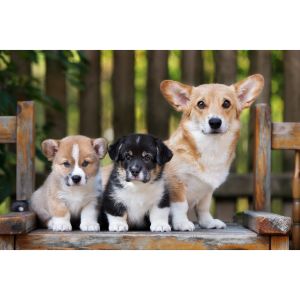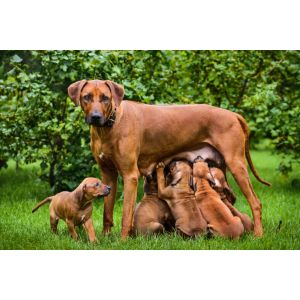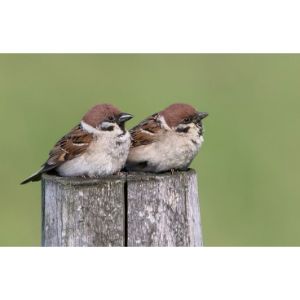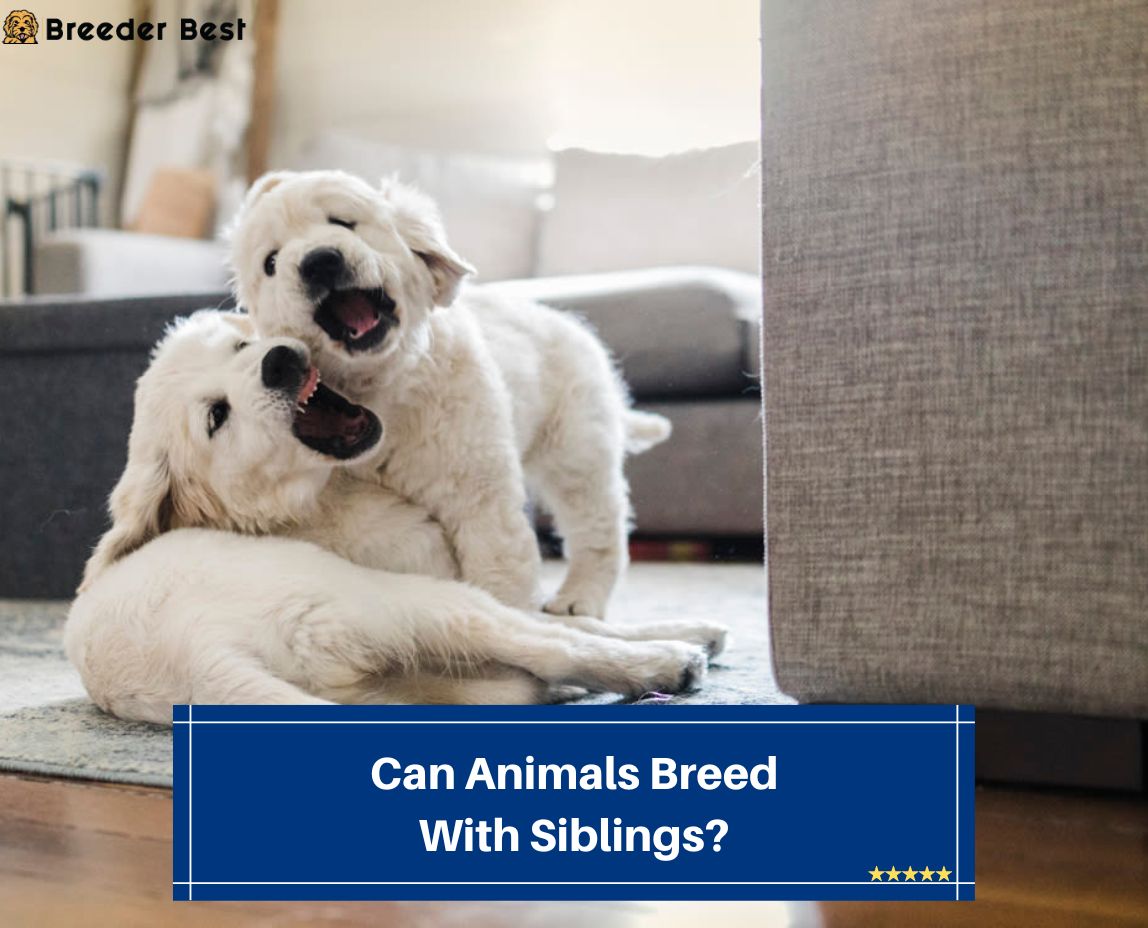Animals do not share the same ethical and moral concerns as humans. Because of this, the same rules that we hold very dearly do not apply to them. This brings an important question to light, can animals breed with siblings?
Yes, animals do often breed with their siblings. While they tend to mate outside their family, if they have no option – they will do so to preserve their lineage. This is quite similar to their behavior with their parents as well.
Also check out these articles: How To Make Dogs Breed Successfully and Will a Dog Breed While Bleeding?
Can Animals Breed With Siblings?
Yes, animals can breed with siblings. Most animals try to find outsiders for mating, but if there’s no choice, they’ll mate with family. This situation happens because animals are biologically coded to reproduce and carry on the family line. If there are no outside animals of their species, they’ll turn to siblings because mating with family is better than not mating at all.
Many animals leave the herd when they reach sexual maturity so they won’t mate with siblings. The behavior continues when the next generation of males leaves their herds to find mates in other locations.
Pheromones can prevent animals from mating with each other. They’re able to smell if someone is genetically related to them. The scent isn’t attractive to them, so they won’t want to reproduce. Whether the males leave the herd or stay close, pheromones can help them be selective with mating.
Reproducing within one family can cause evolutionary problems down the line. But animals have different instincts than humans. They don’t have genetic testing to determine if inbreeding negatively impacts their species. They’re also more compelled to reproduce for safety reasons.
How Do Animals Breed?

If you want to know what keeps animals from mating with family, the answer is nothing. Studies have found that animals mate with their relatives about 73% of the time. Stockholm University studied 88 species for over 40 years to track their mating habits. All studies happened in captivity to control the experiment better than in the wild.
The results found that animals will mate with a relative if that’s the only option. Rather than not mate, their instinct is to try mating to carry on their lineage. It’s in their biology, so they’re not picky about who’s the mate. This issue is especially prevalent in captivity, where the animals are always around each other.
In the wild, animals are more likely to leave their pack. They have a chance to explore a new area of land and meet different animals. Once they leave the herd, they’ll rarely reencounter their relatives. Therefore, there was never a need for them to develop a process to avoid inbreeding. It simply wasn’t likely to happen.
Humans can impact animal reproduction even in the wild. Due to population growth, civilization encroaches on land once left entirely to the animals. When humans start building in those areas, the animals must move. It also changes their migration patterns and guarantees that family members in one herd have prolonged contact with each other.
Zoologists encourage breeding in captivity to sustain at-risk populations. However, the animals born in captivity are often the result of inbreeding. They’re likely to have health complications, including weakened immune systems, which means they’ll have trouble surviving in the wild. Therefore, breeding in captivity isn’t always the best answer.
Many breeding programs share animals, so those in captivity still have a chance to pick their partner. This method of breeding helps encourage genetic diversity. It’s more effective at continuing endangered populations without introducing new health concerns into the mix.
Inbreeding in Animals

Most researchers agree that inbreeding refers to animals mating with close relatives, like parents or siblings. However, cousins are close relations, but there are arguments as to if they fall under the definition of inbreeding.
Cousins have different parents, but at least two of those parents are siblings, so there is still some shared genetics. Scientists only define animals as unrelated if they don’t have a common ancestor in the previous five generations.
In cases with unknown variables, there’s no guarantee that the resulting offspring will be healthy. Any commonality in the family line increases the risk of homozygosity or the likelihood of similar genes.
Farmers don’t often worry about the genetic background of animals they’re breeding for meat. There’s no proof that inbreeding impacts meat quality. Therefore, animals like cows, pigs, and chickens that are only raised for slaughter aren’t held to high standards. There’s no need to keep them healthy and give them a good quality of life.
Some farmers have found that inbreeding pigs lead to a smaller litter. Though inbreeding doesn’t impact the meat quality, it detracts from their overall income because they’ll have fewer pigs to sell. As inbreeding impacts reproductive ability, the problem of litter size can get exponentially worse over time.
What Happens When Animals Inbreed
There is a lot of research on inbreeding in dogs because people want to adopt purebreds. The only way to ensure you have a purebred is to know the background of the mother and father. Breeding dog siblings ensures you’ll have a purebred dog to sell for more money than a mutt.
Breeders use siblings to ensure the next litter has a certain color coat or type of ear. When breeders mate siblings, it can often turn out better than when it happens naturally. If puppies reach six months without getting spayed or neutered, they’re likely to mate with siblings and create inbred puppies.
But inbreeding reduces genetic diversity, which can hinder the animal’s growth. Dog siblings that breed with each other don’t give the strongest genes a chance to come out in their offspring. Illnesses that exist in sibling dogs are easily passed to the next litter and can become more serious. Corgis are just one breed that has health issues due to inbreeding over the years.
The solution to extending a line of purebred dogs is to not mate siblings. Instead, you can mate a purebred Great Dane with another purebred Great Dane from a separate family. You’ll still get the traits of a Great Dane with no shared DNA. Both dogs have different parents, so their litter will have diverse genes, strong immune systems, and are less prone to health problems.
Overall, inbreeding in animals produces the same detrimental effects as it does in humans. Over time, the gene pool becomes less diverse, so it’s more likely that diseases and weaknesses will flourish. There’s a decrease in the health and performance of the animals.
Frequently Asked Questions (FAQ)
What Happens When Siblings Mate?
Inbreeding occurs when siblings mate. Generally speaking, it isn’t obviously dangerous but can have long-term impacts on the health of the entire family if they keep inbreeding.
Does Inbreeding Affect Animals?
Yes, inbreeding does affect animals. It leads to worse reproductive efficiency, and poor growth rates and increases the likelihood for those animals to develop some sort of abnormalities and carry diseases.
Do Wild Animals Know Not To Mate With Siblings?
Yes, generally, animals do not mate with their siblings unless absolutely necessary. At some point, their need to reproduce and produce offspring is a far more important task than ensuring that they mate outside the family.
Conclusion For Can Animals Breed With Siblings

So, can animals breed with siblings? The answer is that no biological component prevents animals from breeding with siblings. They can even mate with their offspring, though these partnerships restrict genetic diversity. Over time, animals resulting from inbreeding will suffer health problems and live a lower quality of life.
For more guides similar to this article about Animals Breeding with their siblings, you can check out:
For more information about Animal Breeding with relatives, check out the video “Is inbreeding dogs safe?” down below:

